Can Things Rise Back Air and Land on the Table Again
How can we be sustainable post-Covid 19?
(Image credit:
Art Wager/Getty Images
)
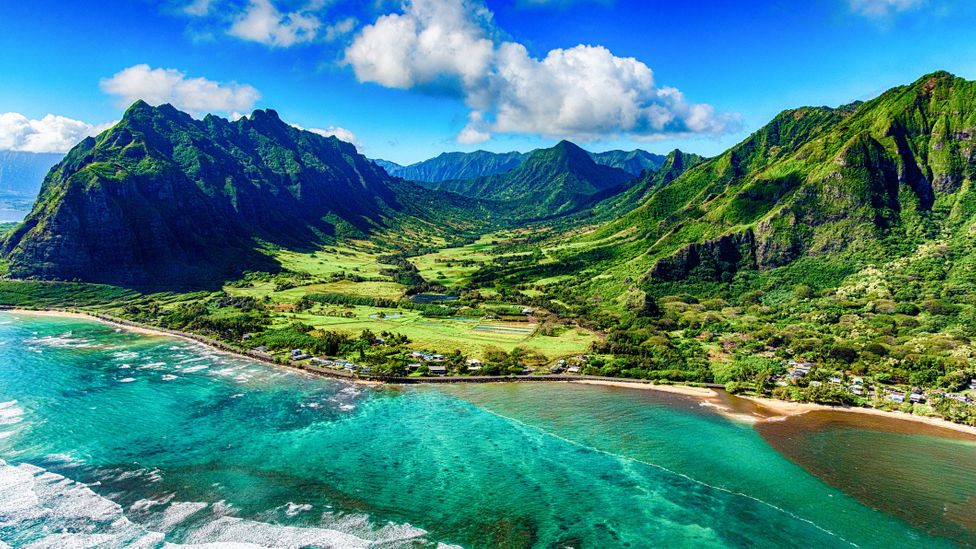
With a ban on non-essential travel and some countries in complete lockdown, we're able to witness what happens to the Earth when we're largely absent for the first time.
A
Equally a travel journalist and someone who cares deeply about the future of our planet, the moral dilemma of air travel is something I constantly grapple with. I've reduced the number of trips I take, buy carbon offsets when I travel and focus my assignments on stories that allow me to tackle conservation issues whenever possible. Just the positive effect these measures have had is hard to quantify.
What isn't as nebulous is this: when the world stays dwelling house, the planet benefits. In that location'south aught good about the coronavirus, but with a ban on non-essential travel and some countries in lockdown, we're able to witness what happens to the Earth when we're largely absent for the first time.
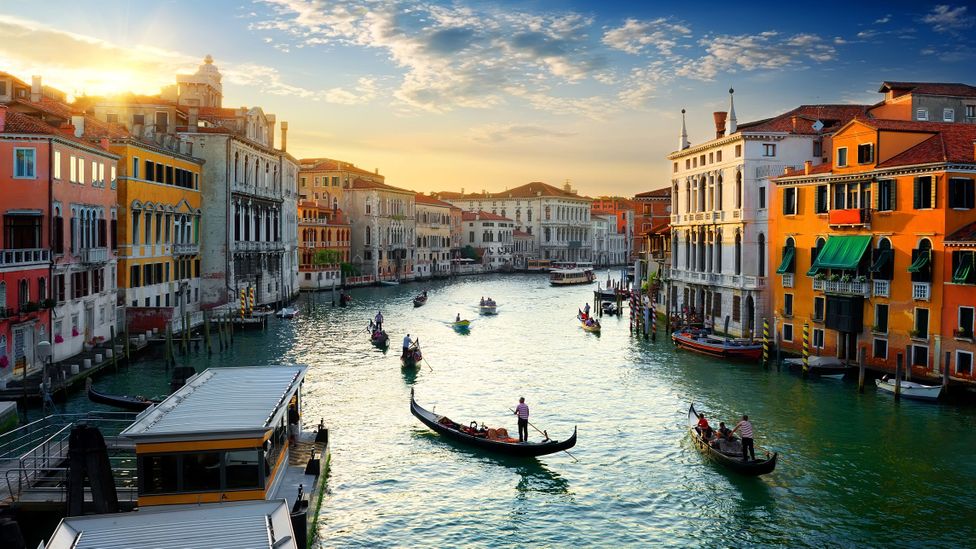
Waterways in Venice currently appear cleaner because of a desperate reduction in tourist boat traffic (Credit: Givaga/Getty Images)
Satellite images published by NASA and the European Space Agency detected a reduction in nitrogen dioxide emissions (which come predominantly from the burning of fossil fuels) from January to February in China, due to the economic slowdown during quarantine. Findings past the Centre for Research on Energy and Clean Air (CREA) show that China's carbon dioxide emissions (which also come from fossil fuel combustion) have reduced by 25% because of measures taken to contain the coronavirus.
During Italy'due south quarantine, similar satellite data has shown a drop in nitrogen dioxide emissions in the country'south northern region; and waterways in Venice appear cleaner because of a drastic reduction in tourist gunkhole traffic (though, much to the chagrin of creature lovers, the photos circulating of dolphins frolicking in the canals were really taken nearly 800km away in Sardinia).
In Republic of india, a nationwide curfew on 22 March resulted in the lowest average level of nitrogen dioxide pollution ever recorded in bound, according to the Centre for Research on Energy and Clean Air (CREA). And every bit North America (one of the world'due south major polluters) enters a major economic downturn, it'due south likely we'll run into similar effects there.
Of course, a global health crisis is not the answer to reducing greenhouse gas emissions, just the phenomenon should give us cause to reverberate on the bear upon human action has on the planet – including how we travel.
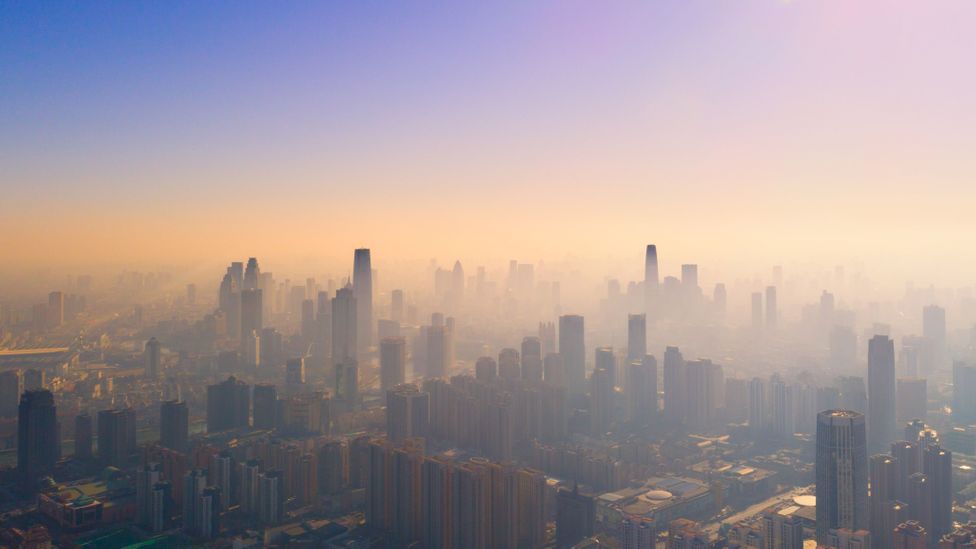
Polluted Chinese cities accept seen a dramatic reduction in nitrogen dioxide levels over recent months (Credit: Liyao Xie/Getty Images)
Restrictions on non-essential travel means airlines are grounding planes, drastically slashing flights or suspending operations completely. While data on the specific environmental outcomes of reduced aviation is yet to be published, we know information technology's likely to take a significant impact. A 2017 report conducted by researchers at the Lund University Centre for Sustainability Studies in Sweden (LUCSUS) in partnership with the University of British Columbia showed that there are iii personal choices we can make to apace cut a lot of greenhouse gas emissions: reduce air and car travel, as well as meat consumption.
You may besides be interested in:
• What tin we learn from 'kind' nations?
• Which countries will recover first?
• Can we travel without travelling?
A 2018 study published in Nature Climate Modify showed that emissions from tourism add upwards to viii% of the global total, with flying making up the largest share of this. "By far, the biggest activeness nosotros can take is to stop flying or to fly less," said Kimberly Nicholas, a sustainability scientist at LUCSUS. "1 round-trip flight from New York to London is the equivalent of about two years of eating meat [in terms of personal carbon footprint]."
In low-cal of these startling statistics – in conjunction with the visible signs of environmental relief we've seen equally the world stays abode to beat Covid-19 – the question needs to exist posed: when we can travel once more, should we?
"There'south just no way to have a condom climate and the business concern-equally-usual plan with the aviation manufacture," said Nicholas.
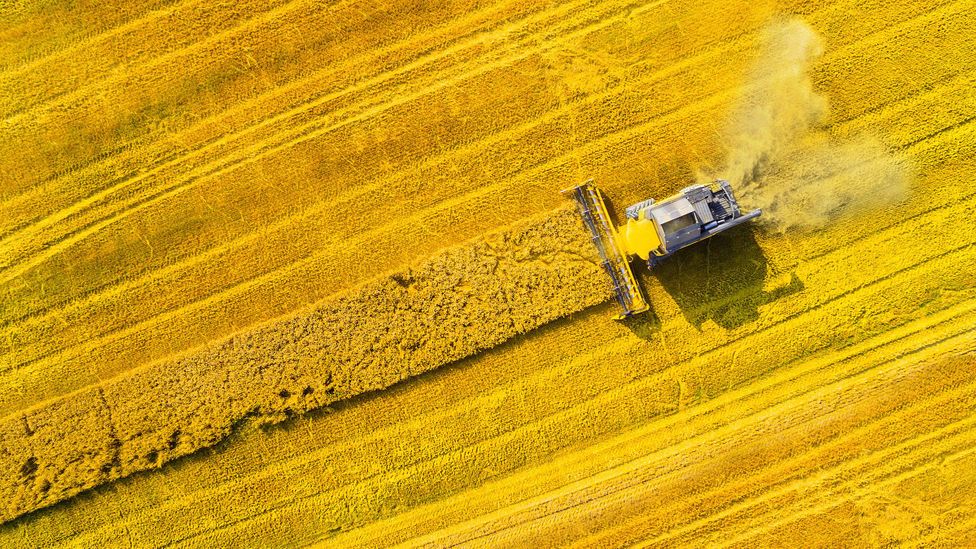
Biofuels offer a solution, just we may non have enough land to spare (Credit: Abadonian/Getty Images)
If nosotros want to encounter the Paris Agreement'south target of limiting global warming to 1.5°C above pre-industrial levels by 2030, nosotros need to make significant changes to how nosotros travel. Part of this is going to have to come from inside the airline and transportation industries.
Some airlines are making headway through research into innovations similar biofuel and electrical-powered aircraft. "There's nonetheless a lot of potential fuel economic system that could be gained from redesigning aircraft to be more efficient," said Colin Murphy, deputy director of The Policy Institute for Energy, Surroundings and the Economy at University of California, Davis. "If you're using waste oil, biofuels typically get virtually 60% greenhouse gas reductions compared to conventional petroleum," he added. The amount of land needed to abound new sources of biofuel – renewable fuel derived from organic materials – could pose a problem, however. And while in that location'due south potential for electric-powered aircraft, Murphy notes that limited battery technology ways this will never be a viable solution for long-haul flights.
Even if we succeed with these technological innovations, we nonetheless demand to change our arroyo to travel as individuals. Merely as the planet seems to be taking a breath right now, nosotros've likewise been offered an opportunity for introspection. The coronavirus pandemic has forced the states to see how interconnected the people, systems and organisations in our world are. While this revelation has been devastating in terms of how chop-chop the virus has spread globally, it's also shown us how we're able to unite and act as individuals for the commonage good. We've practised social distancing to protect the elderly and immune-compromised; we've cheered healthcare workers on from our balconies; and shared the message to #stayhome on social media.
When Covid-19 is behind us, nosotros need to once once more look exterior ourselves and take private action for the adept of the planet. Just every bit coronavirus has forced our lives to dull down, we should consider a slower, more thoughtful approach to travel. There's an accurate connection that comes with a place when we accept the time to empathize its people, culture and natural beauty in a meaningful way. This can't be accomplished with superficial port-to-port itineraries – we could also exercise without the environmental wreckage that a lot of large prowl ships go out in their wake – or past hopping around to a legion of countries in 2 weeks. It might mean taking i longer trip per year instead of packing in five or half dozen shorter ones, which would drastically reduce our carbon footprint.
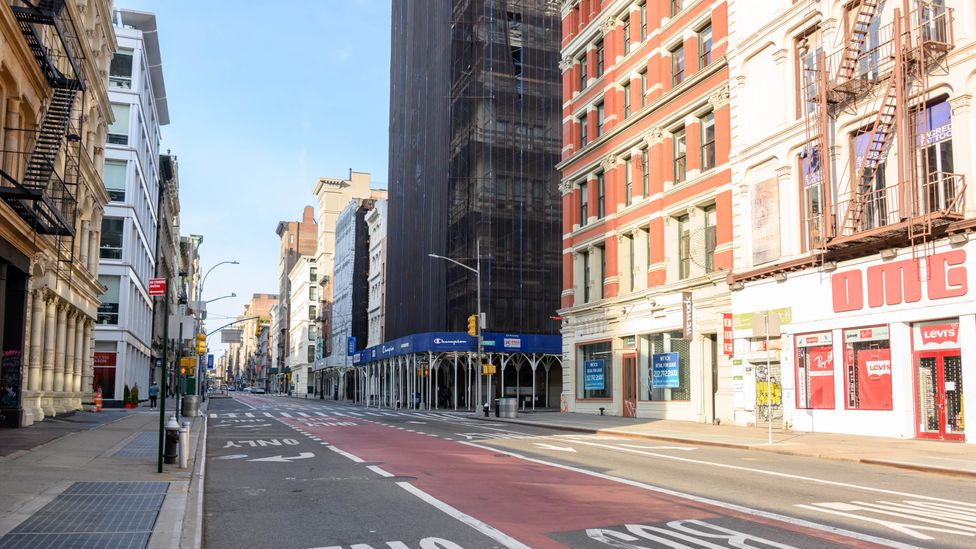
City streets around the world are deserted equally countries try to stop the spread of the coronavirus (Credit: Noam Galai/Getty Images)
"Overtourism is just another form of overconsumption," said Shannon Stowell, CEO of the Adventure Travel Trade Association and sustainable travel abet. "I'm fine seeing tourism numbers lower overall and for the quality of tourism to increase, where people understand the destination better and have a positive impact on information technology versus overcrowding and pollution and wildlife habitat loss – which are all outcomes of likewise much tourism," he added.
Nosotros tin can likewise convalesce some of the ecology stress of travel simply by keeping more of our adventures local. "This is actually the biggest impact we can have," said Nicholas. "I used to be a frequent flyer, but I've found other ways to detect that kind of novelty and adventure. Basically, tiresome travel and self-powered travel." This might wait similar enjoying your local beach instead of one in Mexico and saving your carbon budget for a more than impactful trip.
When we do fly, we tin can purchase carbon offsets. "Carbon offsets help and they admittedly motility the needle," said Murphy. They're not as good as actually reducing the emissions from travel so you're not completely undoing all the harm, only they help." When trying to decide what kind of offset to purchase, it's vital to donate to a projection that's additional, meaning that it didn't exist beforehand. Then, when y'all donate to a crusade that's protecting deforestation, make sure the land in question wasn't going to be protected anyway.
How nosotros wing besides matters. Equally enticing equally the extra legroom in business concern form is, purchasing those seats also increases your carbon footprint because it means less passengers per plane. "The more densely packed you are, the lower your emissions are per rider mile past quite a chip," Murphy notes. "At a policy level, nosotros need transparency about the true environmental impact of our choices, and we need prices to align with those impacts," said Austin Brownish, executive director of the Policy Found at UC Davis. "For case, making outset-class tickets cost more." (The cost tag on first-class seats is used to subsidise cheap economy tickets, reducing the overall toll of travel and assuasive more people to wing.)

Exploring the earth gives usa the global perspective we need to care about the time to come of our planet (Credit: Fine art Wager/Getty Images)
When we're on the ground in a destination, we tin can reduce our footprint by being respectful to the surface area's culture and environs. "When yous travel to a new place, you're a guest in their home," said Stowell. Part of accomplishing this is to cull sustainable adaptation and activities, and a green mode of transportation to explore the identify you're in. This might hateful partnering with a sustainable local tour operator who is more than familiar with the tourism landscape, which is also a way to give back to the local economy.
To weed through eco-tourism greenwashing, travellers should be looking for bout operators with a transparent sustainability program. "If you keep a company website and discover a sustainable tourism plan, and you then come across an touch on report in the side by side 12 to 48 months, you lot know they're putting their money where their mouth is," said Shannon Guihan, chief sustainability officer at The Travel Corporation and their sustainable tourism non-profit, TreadRight, which has developed a checklist to help travellers adopt eco-friendly habits and be more conscious with their choices.
"Nosotros still need travel," Guihan added. "Tourism is 1 of the biggest employers in the world and there are destinations, worldwide, reliant on travel and tourism for survival."
Outside of the global tourism economy, travel has the potential to benefit all of us. When we travel in a meaningful style, nosotros gain cross-cultural understanding and develop greater empathy for people outside of our immediate circumvolve. Travel gives u.s.a. the global perspective we demand to care about the hereafter of our home here on Earth.
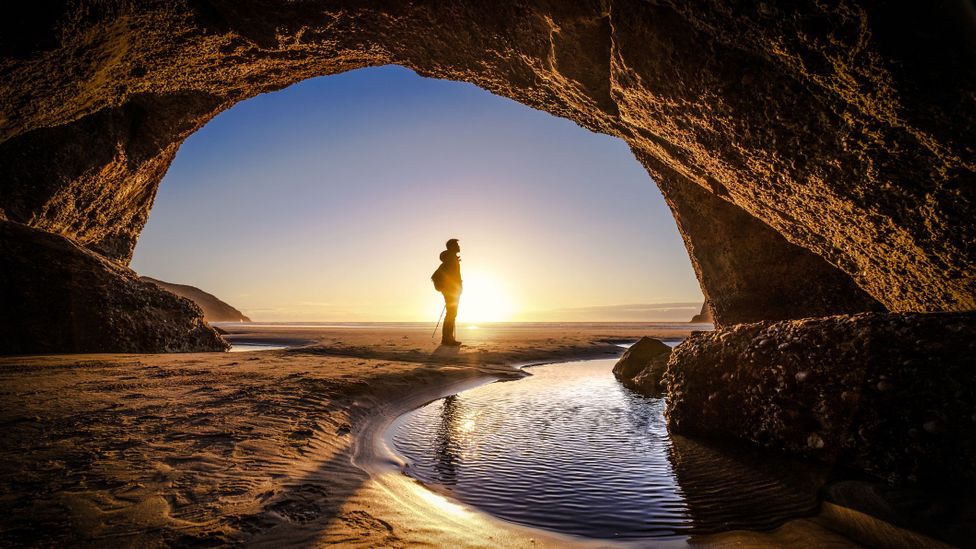
Slow and self-powered travel are good ways to reduce environmental stress (Credit: Skyimages/Getty Images)
Throughout my career as a announcer, I've shared mint tea with Bedouins in the middle of the desert in Jordan, looked into the eyes of a mount gorilla in the lush jungles of Rwanda and tracked tigers under a white-hot sun with local naturalists in India. These experiences have given me a deep appreciation for the vast, diverse, infinitely cute globe we live in, and a desire to protect it.
Our ability to wander has been temporarily taken from us, and never has it felt like more of a luxury. "This crisis might give us the opportunity to instill a new travel mindset," said Stowell. "Travel is a privilege, not a right."
I can't imagine a world without travel, just I know that if we don't change how we travel, at that place won't exist a planet left for us to explore.
Join more than three 1000000 BBC Travel fans by liking us onFacebook, or follow us onTwitter andInstagram.
If you lot liked this story,sign upwardly for the weekly bbc.com features newsletter chosen "The Essential List". A handpicked selection of stories from BBC Future, Culture, Worklife and Travel, delivered to your inbox every Fri.
Source: https://www.bbc.com/travel/article/20200415-how-can-we-be-sustainable-post-covid-19
0 Response to "Can Things Rise Back Air and Land on the Table Again"
Post a Comment